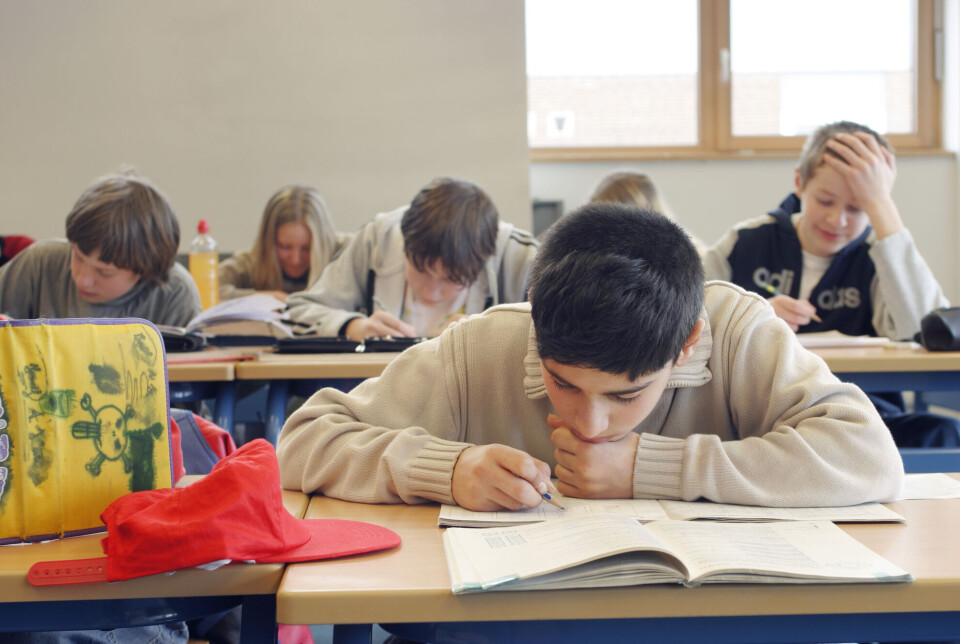THIS CONTENT IS BROUGHT TO YOU BY SINTEF - read more

Norwegian boys dislike school the most
Boys aged 8-14 have significantly poorer experiences with their relationships with teachers, classmates, and the school compared to girls.
Researchers at SINTEF have been responsible for the Norwegian part of a study that has looked into how school children in grades 4 to 7 experience their school setting.
Pupils were asked about what they thought about their teachers and fellow pupils, as well as whether or not they enjoyed school and experienced school as fair.
Norwegian boys say that school is unfair
Researchers found that the most significant differences were between genders. And most noticeably between Norwegian girls and boys.
“For the most part, Norwegian girls enjoy going to school, whereas boys exhibit a marked dislike of the school setting. Norwegian boys’ responses are also more variable than those from Poland and Spain,” says Sébastien Muller, a researcher at SINTEF Digital.
The biggest differences are found when researchers ask if the pupils experience school as fair.
“Norwegian boys experience school as significantly less fair than the girls. It’s almost twice as likely that a boy will respond by saying that he believes that school is unfair,” he says.
Even though boys in Spain and Poland clearly also view school as more unfair than girls, the tendency is far less pronounced than for Norwegian boys.
Compared with Norwegian girls, Norwegian boys also say that they enjoy school much less (boys’ scores are 44 per cent lower). Spanish boys also clearly dislike going to school more than Spanish girls, while in Poland there is no difference between boys and girls.
What Norwegian boys think about teachers
Norwegian boys also stand out by exhibiting the most negative perceptions of their teachers. Again, scores here are 44 per cent lower than for girls. Nor are Polish boys overenthusiastic about their teachers, although their Spanish counterparts are not very different from the girls.
When it comes to what pupils think about their fellow pupils, responses from both boys and girls in Poland and Spain were quite similar. But once again, Norwegian boys stand out in exhibiting a marked negative perception of their fellow classmates.
Common to all three countries is that pupils’ perception of their school, teachers, and fellow pupils deteriorates as they progress through school. Here, Norwegian pupils stand out by exhibiting a slightly more positive tendency – their levels of dissatisfaction increase less with age than in Poland and Spain.
Worsened after the pandemic
This study was carried out for the first time in the autumn of 2019, just before the Covid-19 pandemic took over. It was repeated in the autumn of 2020, after the initial global wave of infection.
The pandemic clearly had a negative impact on everyone’s experience of the school setting, with an approximate 20 per cent reduction in all scores in all surveyed countries.
Researchers were hardly surprised that stringent restrictions and long periods of school closures had a negative impact.
“However, we were surprised to see that the negative impacts were similar in Poland to those in Norway, even though Polish schools were closed for almost twice as many weeks. This shows that there were many other factors that influenced the impact of pandemic measures on pupils,” says Mari Gunnes, also a researcher at SINTEF Digital.
Male or female teacher
In Norwegian primary and lower secondary schools, 75 per cent of all teachers are women. Does a teacher's gender play a role in determining pupil satisfaction?
“It looks like it. In our study, we see that boys are more or less just as satisfied, regardless of their teacher's gender. At the same time, it appears that girls get on better at school with male teachers than with women," says Muller.
He explains that there is a 34 per cent greater probability that a girl will say that she is more satisfied with school if her teacher is a man.
Combining the genders, the researchers see a somewhat greater probability that pupils will enjoy school more if they have a male teacher.
"So, if we take the genders together, we thus see a somewhat greater probability that pupils will enjoy school more if they have a male teacher,” he explains.
School suits girls better
Schools development manager Kjetil Ulsrud Lundemoen at Modum municipality has been closely involved with the survey conducted at five of the municipality’s schools.
He has his own thoughts on why boys see the school setting in a poorer light than girls.
“One likely reason is that a much greater proportion of pupils in Norway attend a fully integrated school system. Spain and especially Poland have special schools that take care of pupils with behavioural difficulties. I also believe that for a larger proportion of boys, a greater focus on theoretical studies is experienced as being more demanding and less relevant," he says.

Lundemoen emphasises that it's not that girls don’t enjoy practical subjects, but they can ‘tolerate’ the academic aspects better.
"Fortunately, the pendulum is starting to swing the other way. Look at the findings from the evaluation of the Norwegian government’s so-called six-year reform, for example, or the grant scheme designed to promote a more practical teaching emphasis, as well as the introduction of new reforms to primary and lower secondary education,” he says.
Why are boys’ perceptions of unfairness so marked?
“I believe that there's a link here to disciplinary sanctions taken by schools and teachers in response to disruptive behaviour and acting out, to which boys are more prone. It’s less common for girls to externalise so visibly and physically when they are frustrated. This enables them to be more resilient to their surroundings,” he says.
Lundemoen also points out that boys spend a lot of time gaming and less time participating in organised activities outside school hours.
“I think that there may be a mismatch between what boys get up to at school and what happens at home. Perhaps as parents, we’re too skilled at arranging things for them. Boys fail to acquire enough of the social and emotional skills they need to tackle the challenges and resistance they encounter in the school environment,” he says.
Need for targeted action
The SINTEF researchers conclude their study with a number of proposals.
“Schools must adopt a holistic view if they are to tackle the many factors that contribute towards a pupil’s experiences of a poor school setting. We also believe that it's appropriate to target measures at certain groups of pupils, focusing especially on boys and pupils of both genders in the upper grades,” says Mari Gunnes.
Reference:
Gunnes et al. School climate during the Covid-19 pandemic in three European countries. A cross Sectional pre-post quasi experimental study, International Journal of Educational Research Open, 2024. DOI: 10.1016/j.ijedro.2024.100336
———
Read the Norwegian version of this article on forskning.no
More content from SINTEF:
-
Saving seagrass and French oysters: New solutions give new life to Europe's coastal areas
-
What does ultra-processed food do to our gut flora?
-
This new device can make it cheaper to heat your home
-
Propellers that rotate in opposite directions can be good news for large ships
-
How Svalbard is becoming a living lab for marine restoration
-
New study: Even brand-new apartments in cities can have poor indoor air quality





































